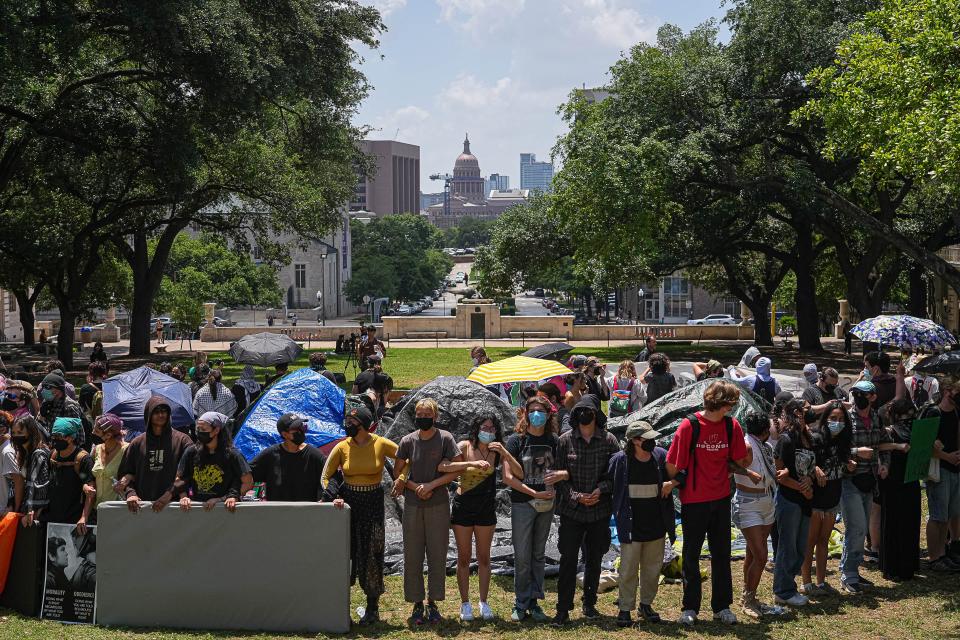Texas Senate panel to discuss SB 17, free speech, antisemitism. Here's what to expect.
- Oops!Something went wrong.Please try again later.
- Oops!Something went wrong.Please try again later.
The Texas Senate Subcommittee on Higher Education will have a public hearing at 9 a.m. Tuesday at the Capitol to review institutions' compliance with Senate Bill 17, make recommendations for how college campuses can better combat antisemitism and review free speech policies.
The hearing has no limit on how many people can give public comment, but each speaker will be limited to two minutes. The committee will take no action but will make recommendations.
Here's the background on the topics that will be discussed at the meeting:
Senate Bill 17
SB 17 is a law that bars institutions from having diversity, equity and inclusion offices. The hearing comes after a letter Sen. Brandon Creighton, R-Conroe, sent to chancellors March 26 warning them to comply with the law.
Texas public institutions were required to comply with SB 17, which passed last year, by Jan. 1. Creighton, who wrote the bill, warned in his March letter that institutions found not to be compliant can face potential loss in funding or legal ramifications.
At the hearing, the general counsel and chancellor for each Texas university system will present how their institutions are implementing SB 17 and monitoring compliance. That will include answering questions on how they have ensured there is no mandatory training, DEI office or employees who complete those functions; how they have ensured no preference is given due to race, color, sex, ethnicity or national origin in hiring; and how they will prepare for a mandatory audit.
A week after the letter was sent, the University of Texas at Austin terminated about 50 employees who formerly worked in DEI positions and closed its Division of Campus and Community Engagement in what President Jay Hartzell said was a reorganization related to SB 17. UT-Dallas followed suit, closing its new Office of Campus Resources and Support and laying off about 20 employees April 9.
The job terminations have resulted in outcries from students, Democratic legislators, rights groups and the Texas chapter of the American Association of University Professors, who said the move took away essential student services. But the cuts have been praised by some conservative legislators as a way to ensure a return to merit-based rewards.
Antisemitism
A day after Creighton's letter, Gov. Greg Abbott issued an executive order calling for institutions to revise free speech policies to better protect against rising antisemitism after Oct. 7, the day of the deadly attacks by Hamas on Israel that caused the nation to declare war. Chairs of university boards of regents were required to respond and assert their compliance within 90 days.
The Senate committee's hearing notice charges committee members to "review campus policies to prevent antisemitism" and analyze how improvements can be made while still protecting free speech. The committee will also look at how institutions oversee "the formation and operations of student organizations" and their access on campus.
In his March executive order, Abbott singled out the Palestine Solidarity Committee and Students for Justice in Palestine, but the order and the hearing item did not mention protections against Islamophobia, which has also been rising since Oct. 7.

Free speech
The last topic of the hearing is to examine the procedures of Texas public universities "designed to protect the first amendment free speech rights of faculty, staff, and students," including compliance with Senate Bill 18 from the 86th Legislature concerning protected speech on campuses, and "make recommendations for any needed reforms."
Senate Bill 18, passed in 2019, tasks universities to "ensure that the common outdoor areas of the institution's campus are deemed traditional public forums" and allow "any person to engage in expressive activities in those areas of the institution's campus freely" as long as the conduct is not disruptive or unlawful.
In the past several weeks, more than 150 pro-Palestinian protesters have been arrested after demonstrating at multiple Texas universities, including UT-Austin, the University of Houston and UT-Dallas.
The protests joined universities across the nation in demanding the institutions divest from weapons manufacturers contributing to Israel. In some cases, protesters have set up or attempted to set up encampments on university lawns.
Public testimony
Pauline Strong, the president of the UT-Austin chapter of the American Association of University Professors, said people from Austin and beyond are expected to provide public testimony, particularly about the effects of SB 17 on students, staff and faculty.
Strong said she is also interested in hearing how institutions have interpreted SB 17 differently and hopes to hear how the police response to the recent pro-Palestinian protests can be reconciled with free speech rights and Senate Bill 18.
"All three items of the agenda ... relate to AAUP's core missions of protecting academic freedom and promoting shared governance and due process," Strong said. She added that she hopes the testimony will impact how legislators are thinking going into the next session.
The meeting will take place in the E1.028 hearing room.
This article originally appeared on Austin American-Statesman: Texas Senate panel to tackle SB 17, free speech, antisemitism

